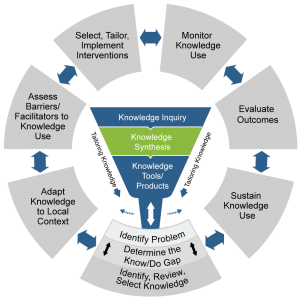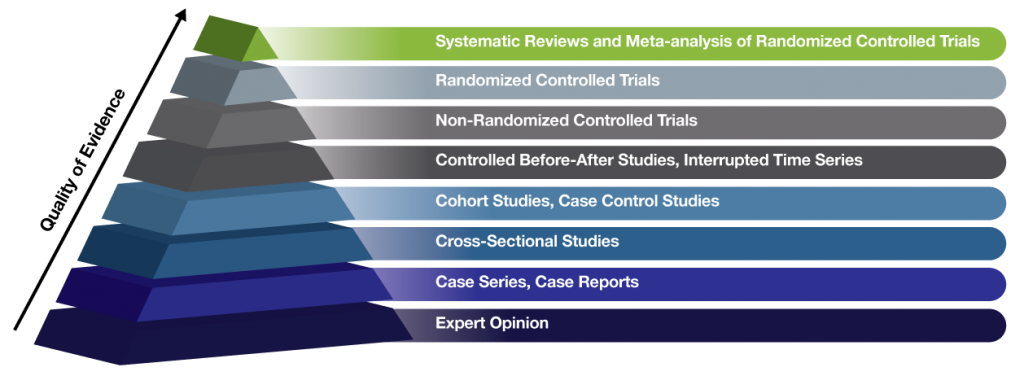As part of St. Michael’s Hospital Knowledge Translation program, the Knowledge Synthesis Team (KST) actively engages in the Knowledge to Action cycle.

The Knowledge To Action Cycle adapted from Graham et al., JCHEP 2006
The Knowledge to Action cycle consists of the action cycle and the knowledge creation funnel.
The action cycle emphasizes the dynamic action steps needed to apply the knowledge created (in any sequence).
Central to this is the knowledge creation funnel, which conveys the idea that knowledge needs to be increasingly distilled before it is ready for application.
The funnel includes:
Knowledge Inquiry: First generation knowledge (e.g., broad base primary studies or information)
Knowledge Synthesis: Methodologies for determining what is known in a given area or field and what the knowledge gaps are (e.g., systematic reviews)
Knowledge Tools/Products: Refined knowledge for decision-making (e.g., guidelines, decision aids, algorithms)
The action cycle includes:
Knowledge synthesis is the foundation for informed health care decisions, including evidence-informed medicine, health technology assessment, guideline development, policy decisions, and research funding
KS provides the foundational evidence used for KT products by different types of knowledge users (KUs):
Patient decision aids → Used by patients (the public)
Clinical practice guidelines → Used by health care providers (e.g., doctors, nurses, pharmacists)
Policy briefs → Used by policy makers and health care managers (e.g., the government)
Importance of Knowledge Synthesis
Basing decisions on findings of an individual study might be misleading. Highly cited clinical studies contradicted or had reduced effect size in subsequent studies over time (Ioannidis et al., JAMA 2005). Basing decisions on expert opinion can be biased. In one study, experts were 10 years behind on the latest research, did not mention effective therapies, and even recommended ineffective therapies (Antman et al., JAMA 1992).
It is difficult for knowledge users to keep up with the literature; there are 75 randomized controlled trials and 11 systematic reviews published per day (Bastian et al., PLOS Med 2010).
As such, knowledge synthesis is a useful tool that can be used to:
- Make sense of the results of many different studies in a way that can be used by knowledge users who do not have the skills (or time) to summarize the evidence
- Statistically combine the results of multiple studies, increasing our confidence in the results (power and precision)
- Sort through the results arising from conflicting studies
- Justify why a new study (e.g., randomized trial, cohort study) is necessary
CIHR defines Knowledge Synthesis as “The contextualization and integration of research findings of individual research studies within the larger body of knowledge on the topic. A synthesis must be reproducible and transparent in its methods, using quantitative and/or qualitative methods.”
Knowledge synthesis is central to evidence-informed decision-making. On the hierarchy for quality of evidence, systematic reviews and meta-analyses are ranked the highest.
What we do
The KST is committed to conducting studies that have the potential to improve health outcomes. The topics of these projects are either internally or externally generated. The internal topics are related to advancing the science of knowledge synthesis, to better respond to decision-makers. External research questions are often applied topics put forth by a variety of organizations, such as Health Canada, Canadian Agency for Drugs and Technologies in Health, provincial ministries, health authorities, or hospitals.
We have extensive experience advancing the science and applying numerous types of knowledge syntheses, such as:
- Systematic Reviews
- Meta-analysis
- Network Meta-analysis
- Scoping Reviews
- Overview of Reviews
- Rapid Reviews
- Diagnostic Reviews
- Health Economic Reviews
- Emerging Knowledge Synthesis Reviews


